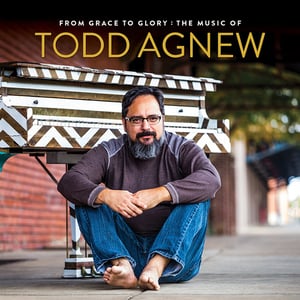
An Interview about “Glory to Our Great Redeemer,” from the latest collection of new worship music by Todd Agnew.
DW: A lot of our members are probably familiar with your worship song, “Grace Like Rain.” How did you come to write one of CCLI’s most popular worship songs?
TODD: Years ago, my friend Chris Collins came to me and played a version of Amazing Grace with a new tune. I loved it but felt like it needed a chorus, so I wrote one. Then we forgot about the song. About six months later, we were leading a night of worship. I turned to him and said, “You know what would work really well in this set? That version of Amazing Grace, but I don’t remember it.” He said, “Oh, it goes like this.” I said, “Yeah, but I wrote that whole chorus, and I don’t remember it.” He said, “Oh, it goes like this." So, we played it. And God moved. And He is still moving.
DW: For the past four years, you’ve been pursuing your Master of Divinity degree at Dallas Theological Seminary. How has this changed the way you wrote “Glory to Our Great Redeemer”?
 TODD: I once read a book that asked why we use so many metaphors for what happened at the cross. We say that sins were forgiven, covered, pardoned, that Christ was a lamb, a sacrifice, a substitution, that we were redeemed, rescued, ransomed. The author asked which one of these was actually correct, and why do we continue to use the rest of them. That question bothered me ever since.
TODD: I once read a book that asked why we use so many metaphors for what happened at the cross. We say that sins were forgiven, covered, pardoned, that Christ was a lamb, a sacrifice, a substitution, that we were redeemed, rescued, ransomed. The author asked which one of these was actually correct, and why do we continue to use the rest of them. That question bothered me ever since.
I started writing a song a couple of years ago, and the first four lines went:
Glory to our great redeemer
Spotless Lamb for sinners slain
My pardon purchased, my ransom paid
Glory, glory to His name
Oh no! I used four different metaphors just in the beginning of this song! And it paralyzed me. I have put so much emphasis on correct theology that I didn’t want to write something that was wrong. So I put the song on the backburner and left it there until I got to seminary.
In my time there, I took a class on soteriology (the doctrine of salvation) with Dr. Scott Horrell. In an assignment, Dr. Horrell led us through many different biblical passages explaining what happened at the cross. It turns out we use all those metaphors because they’re all in the Bible!
The more I thought about it, the more sense it made. One simple human metaphor would not be able to describe God’s plan to redeem all of mankind. So instead, God painted a beautiful picture, each metaphor another brushstroke, helping us understand what He has done for us. He is all of these things to us, doing all these things for us, remaking us in all of these ways.
DW: “Glory to Our Great Redeemer”seems to focus on the wrath of God. Isn’t that a strange subject for a worship song?
TODD: Yes. After I wrote it, a friend asked if I was sure I wanted to sing about God’s wrath, especially in the third line of the chorus: “The wrath of God poured out and satisfied.” The wrath of God is not a popular worship theme. You can probably count all the wrath of God songs in the CCLI Top 100 on one hand.
I know a lot of those writers and trust that they are writing about what God wants them to be writing. But in this instance, I could not steer away from this issue. It is too valuable in our consideration of our redemption in Christ. It is too valuable for me personally.
“For all have sinned….” This is one of the first verses I learned as a kid, and I have never doubted it. One look at the world around me or one look in the mirror was enough to convince me. So it wasn’t hard for me to believe that I needed to be justified by his grace. But where does wrath come in?
God is righteous and holy. Sin is a direct offense against his righteousness and holiness. So God actually cannot ignore his wrath for our sin and still be just, still be holy. For God to overlook sin would violate his character. It would require for him not to be holy or righteous. So God’s perfect and right response to sin is wrath.
However, in his mercy, God chose not only to expend his wrath but also to receiveit. I heard this word “propitiation” many times growing up. But I didn’t understand it until later. One explanation is that propitiation is something that stands in the way, specifically of wrath. A theological definition is “an appeasement of wrath by sacrifice.” God chose to appease his own wrath by the sacrifice of his own and only son, Jesus. Jesus stood in the way of God’s wrath. It was wrath I deserved for my sins. In this way, God was both just in his wrath and the justifier by taking wrath I deserved, making it possible for me to be justified (Romans 3:26).
 A couple of years ago, I heard a preacher say, “Some of you feel like God is angry at you because of your sins.” And of course, I agreed with him. Why wouldn’t God be angry? I was mad about my sins. My parents were mad about my sins. So God must be mad about my sin. But as we’ve seen, that’s not really how it works. Fortunately the preacher continued, “God is not angry at you. He poured out all his wrath on his son at the cross and there is none left over for you.” I wanted to disagree with him. It didn’t sound right or fair. But I knew he was correct. Jesus did not die on the cross to take some of God’s wrath while God saved a little parcel for me and my mistakes in 2017. No, Elvina Hall said it right when she wrote the hymn, “Jesus Paid It All.”
A couple of years ago, I heard a preacher say, “Some of you feel like God is angry at you because of your sins.” And of course, I agreed with him. Why wouldn’t God be angry? I was mad about my sins. My parents were mad about my sins. So God must be mad about my sin. But as we’ve seen, that’s not really how it works. Fortunately the preacher continued, “God is not angry at you. He poured out all his wrath on his son at the cross and there is none left over for you.” I wanted to disagree with him. It didn’t sound right or fair. But I knew he was correct. Jesus did not die on the cross to take some of God’s wrath while God saved a little parcel for me and my mistakes in 2017. No, Elvina Hall said it right when she wrote the hymn, “Jesus Paid It All.”
So, you see I had to write about wrath. Because the fact that Jesus received the wrath that I deserve is good news. It is the gospel. It allows me to have resurrected life and a relationship with the father. It is one of many reasons we sing “Glory to our Great Redeemer.”
DW: A lot of our member churches blend traditional choir music and contemporary worship songs. As a guy who’d been leading worship for more than two decades, what advice do you have for them?
TODD: Mainly, I don’t think God is as hung up on musical styles as we are. I think we need to spend some time figuring out what worship really is and how our church body can do that. As lovers of God, we respond to the revelation of God’s character and his will in worship. We often try to make our response beautiful in response to his beauty, our antiphon [response] to his gorgeous melody. Sometimes that beauty is couched in a wonderful four part choral arrangement. Other times it is captured in stereo delayed electric guitars and cadenced snare fills. And we should prepare ourselves because soon that beauty will be expressed in a new way.
But the heart of all of these styles is to allow the people of God to respond to their Savior. I love seeing generations and traditions flow and mingle, creating a beautiful tapestry. But more than that, I love to see God’s children loving their Father well. If they are doing that, I don’t really care what it sounds like.
---
Todd Agnew is a nationally respected songwriter, worship leader, speaker and Ardent Records recording artist. He and his family currently live in Dallas, TX, where he is attending Dallas Theological Seminary. He is known for such songs as Grace Like Rain, This Fragile Breath, My Jesus, and Our Great God (w/Rebecca St. James). Find out more at toddagnew.com.
---
Other Discover Worship resources from Todd Agnew:
- Blog: The Words Between Our Songs
- Song: Grace Like Rain
- Song: This Fragile Breath
- Song: Gloria





